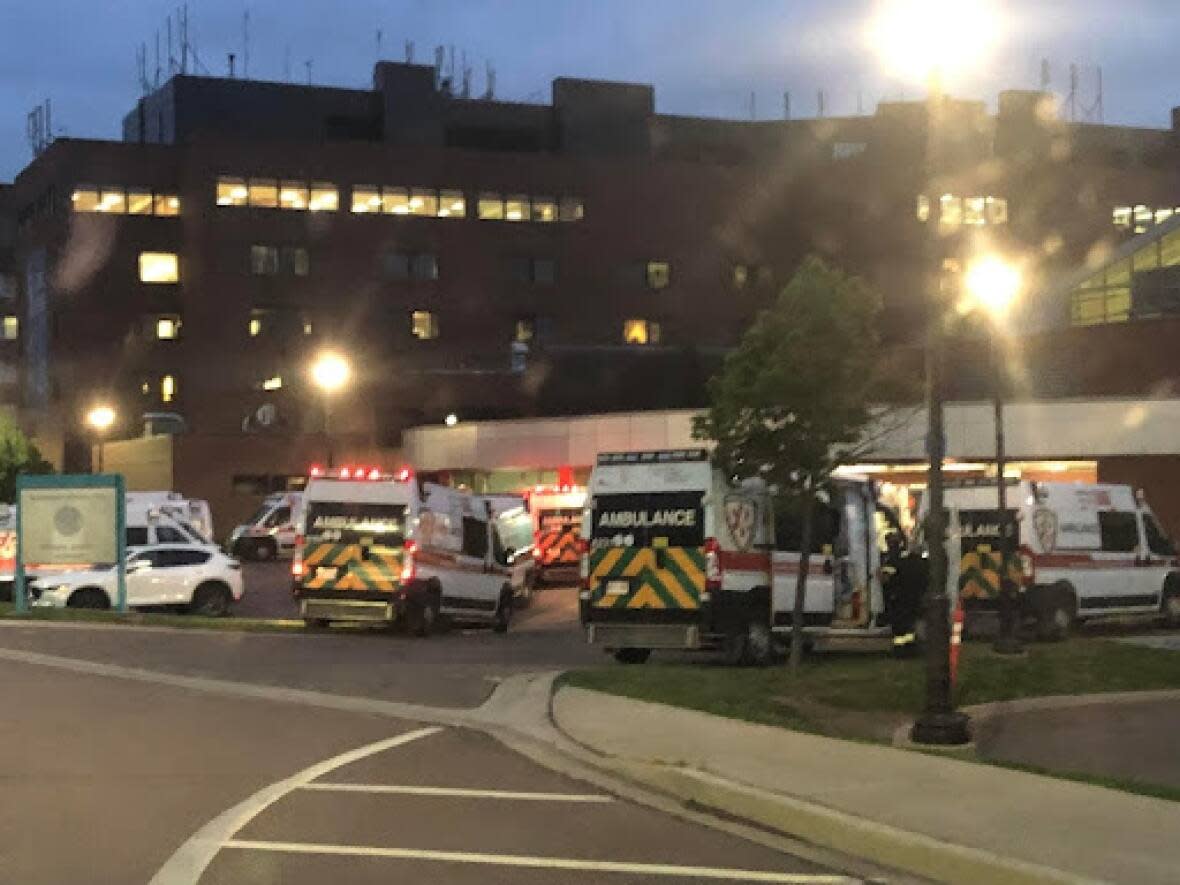Ambulance offload delays at N.B. hospitals leave village stations empty

New Brunswick paramedics say offload delays at hospitals have been getting worse and are yet another symptom of a health-care system increasingly under strain.
On a recent night outside the Moncton Hospital, as many as 15 units were tied up. Waiting times on June 27 ranged from 52 minutes to nearly 14 hours, according to Ambulance N.B.
What is less visible is how this impacts smaller communities. Crews in towns and villages then may be called up to work in larger centres, leaving stations like the one in Blackville unstaffed.
"This is a result of everything that is going on in the health-care system," said Chris Hood, executive director for the Paramedic Association of New Brunswick.
Patients can't be abandoned before they are transferred fully into hospital care, he said.
"At least one of the two paramedics is at the patient's side, actively monitoring them."
Rarely are patients cooped up in the back of the vehicle. It's more common, he said, for patients to spend hours on ambulance stretchers, parked in a hospital hallway or some kind of hospital holding area.
Meanwhile, first responders know the calls keep coming in.
"Just think of the dilemma those two paramedics feel … when they know that [they] might be able to make a difference in that person's life," Hood said.
They're thinking, "I'm sitting here because the system is broken and I'm not able to respond."

They also hear the ripple effect as ambulances have to be dispatched to emergencies that are farther and farther away.
Hood said a call in Fredericton could be answered by an ambulance from Saint John or Grand Falls.
Typically, he said, ambulances are taken from smaller communities and redeployed to bigger centres.
"We can use Blackville, for example. That leaves those communities uncovered because that's not typically where the next call is going to come from."
Blackville meeting
Village councillors in Blackville have been so concerned about how often their ambulance resources get pulled away, they hosted a meeting earlier this week with Ambulance N.B. managers.
Deputy Mayor Denver Brennan said it felt productive to have a discussion, and going forward, the two sides hope to meet every three months.
Brennan said offload delays, especially at the Moncton Hospital, and the repositioning of resources were identified as part of the overall problem.
Councillors were also informed that staffing was an issue.
Ambulance N.B. says it has three vacancies at the Blackville station, including two full-time positions and one part-time position.
While recruiting is a priority, the service says vacancies in rural areas are more difficult to fill.

Meanwhile Ambulance N.B. continues to monitor patient satisfaction through surveys conducted twice a year by a third party.
According to the latest results from June, 95 per cent of respondents were satisfied.
Brennan said the part of the meeting that bothered him most was a caution from Ambulance N.B. that the crisis could continue for another five to 10 years.
"I don't think we can let this go on for five to 10 years," he said. "And it's much more than a municipal issue. Looking at the numbers across the country, it looks like a national issue."
CBC requested an interview with Ambulance New Brunswick but was provided instead with a written statement from Jean-Pierre Savoie, the vice-president.
"We really appreciated the opportunity to meet with the Blackville Municipal Council yesterday. It gave us a chance to update them on some important initiatives we've been working on, discuss some of the challenges we've been facing, and answer any questions they had.
"Questions from council members included topics ranging from staffing shortages, recruitment challenges and potential solutions. We felt it was a very important discussion and we've offered to meet with them on a recurring basis if that would be helpful."


